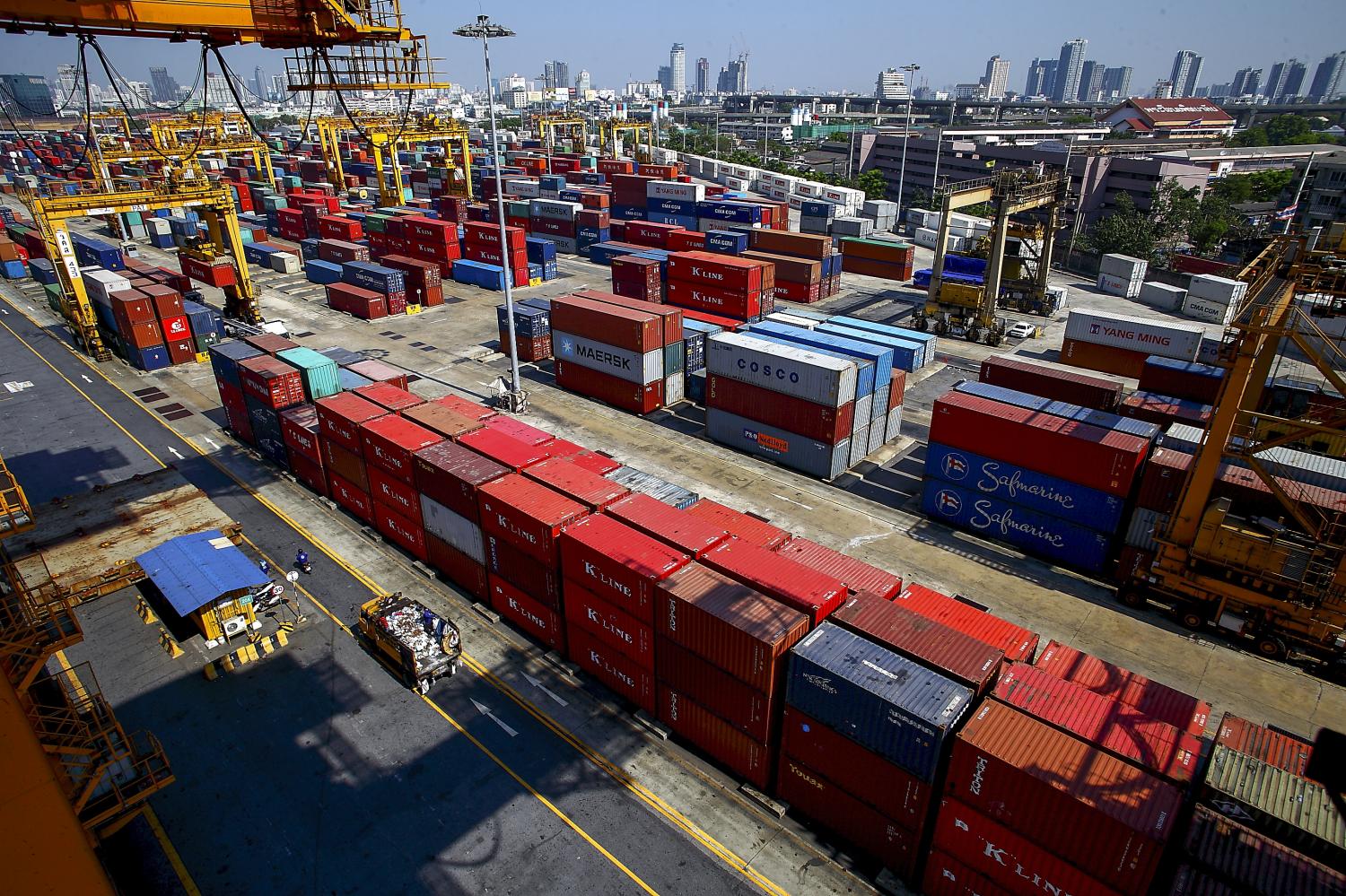
The Thai economy and exports have bottomed out and can start to rebound, but US-China retaliatory tariffs remain a risk factor and warrant close attention, according to a senior official from the Bank of Thailand.
The economy bottomed out in the second quarter while outbound merchandise shipments showed signs of picking up after June, said Don Nakornthab, senior director of the economic and policy department at the central bank.
The forecast for export growth excluding gold continued to improve in August, with outbound shipments for the second half faring better than in the preceding six months due to the base effect, production base relocation, higher export orders to avoid the impact from new tariffs on Chinese goods and the Commerce Ministry's export stimulus measures.
Exports are expected to grow in the fourth quarter, but a contraction is likely for the full year, Mr Don said. The central bank is maintaining its estimate of zero export growth this year.
"Stripping out gold items, Thai exports in July showed better signs and it has bottomed out since June," he said. "However, the situation remains uncertain and trade tension between the US and China needs further monitoring because it's unpredictable."
In July, the value of merchandise exports based on balance of payments grew by 3.8% from the same period last year, the first growth in eight months, compared with a contraction of 2.1% in the previous month.
Exports in several categories continued to expand, partly due to demand driven by substitutions for Chinese goods in the US market, Mr Don said.
Without counting gold, Thai exports remained down 1.7% in July. For the first seven months, the country's exports reached US$141.6 billion, a 3% contraction from a year earlier.
Against the backdrop of global uncertainties, Thailand's economic growth could come in at below 3% this year, Mr Don said.
The central bank in June cut its GDP growth forecast for 2019 to 3.3% from 3.8% and looks set for a further downgrade in September.
To reach the central bank's forecast, the growth rate must hit 3.5% in the third quarter.
The economy grew by 2.3% year-on-year in the second quarter, down from 2.8% in the first quarter and the slowest pace in 19 quarters.
The unemployment rate inched higher to 1.1% in July from 0.9% in June. Although Thailand's jobless rate is considered low relative to many countries, the uptick raised concerns of an impact on domestic consumption.
Longer-dated bonds
Mr Don said the Bank of Thailand increased bond supply in September from the month before for liquidity management purposes.
The central bank will raise the supply of its bonds with one-year maturity by 10 billion baht to 50 billion baht in September, reflecting efforts to encourage foreign investors to keep switching to longer-end notes.
"The central bank wants to curb foreign fund inflows parked in short-term bonds by implementing measures in July, but their investment in long-term bonds is not our concern," Mr Don said.
The central bank started to rein in short-term offshore fund inflows by reducing its new short-term bond supply as part of measures to curb the baht's strength.
It then stepped up efforts by lowering the cap on the outstanding balance of non-resident accounts from 300 million baht per person to 200 million baht and requiring a report with the names of end beneficiaries for all non-resident holdings of Thai debt securities.
Foreign portfolio investment in Thailand in July was reduced by $172 million, largely due to $655 million in offshore fund outflows from debt instruments.
The baht is the top-performing currency in Asia, up more than 6% against the US dollar so far this year.
Weaker baht
Amonthep Chawla, executive vice-president and head of the research office for CIMB Thai Bank, predicted that the baht would weaken to 30.90 versus the dollar by year-end.
The research house also downgraded the Thai GDP growth outlook for this year to 2.8% from 3.3% because of the export contraction and the US-China trade spat. Uncertainties will sap domestic consumption and investment, Mr Amonthep said.
Thailand's year-on-year private investment growth is expected to shrink in the second half of this year, he said.
The central bank will step up its effort to boost economic growth by cutting the policy rate to a record low of 1.25% from 1.50% in the final quarter this year, Mr Amonthep reckoned.
Meanwhile, Donald Hanna, group chief economist of CIMB Group, said the US-China trade dispute is set to dampen the growth of the world's two biggest economies.
But he estimated China's economy to grow at a faster pace than its potential at 6.2%, thanks to stimulus measures.
China will continue running a current account deficit, he said, pressuring outbound tourism and lowering the number of Chinese tourists.
CIMB forecasts the US Federal Reserve to cut its rate three times over the course of the next 12 months to support economic momentum, below the market's consensus of four cuts with a combined reduction of 1 percentage point.
If CIMB's forecast takes hold, capital flows will reverse and be repatriated to the US, strengthening the greenback against other currencies, Mr Hanna said.
